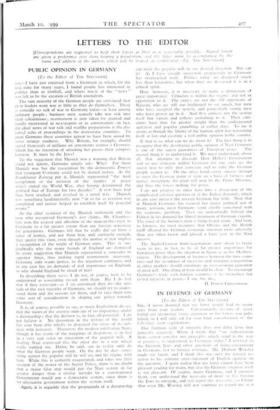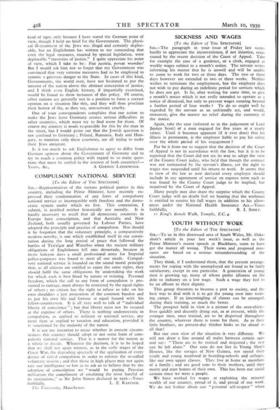IN DEFENCE OF GERMANY [To the Editor of THE SI , E(. - IEVI
OR 1
never doubted that my letter would lead to angry cries from your readers. Uninnunately, reasons of space forbid my answering every argument in the letters you pub- lished, so 1 will only ask for your kind consideration of the following short explanations.
Our German code of morality does not differ from that generally accepted. When I wrote that " an authoritarian State cannot consider any principles which stand in the way of progress, as understood in Germany today," I referred to the German Jews and other questions of home-government in Germany, not to foreign relations. Mr. Herbert Worsley made me laugh, and I think this was only the natural re- action to his extreme over-statement of English opinion on the question. I quite realise that my letter cannot have been pleasant reading for many, hut also the German situation itself is not pleasant. Of course, many Germans, and I amongst them, can understand the necessity of more or less forcing the Jews to emigrate, and still regret this netesitv; so I hope that even Mr. Worsley will not continue to regard me as a
kind of ogre, only because I have stated the German point of view, though I hold no brief for the Government The physi- cal ill-treatment of the Jews was illegal and certainly deplor- able, but an Englishman has written to me contending that even the legal measures, enacted by special legislation, were deplorable "travesties of justice." I quite appreciate his point of view, which I take to be: Fiat justitia, pereat mundus! But I would ask him not to forget that my Government was convinced that very extreme measures had to be employed to remove a grievous danger to the State. In cases of this kind, Governments, the world over, have not hesitated to put the interest of the nation above the abstract conception of justice, and I think even English history, if impartially examined, would be found to show instances of this policy. Of course, other nations are generally not in a position to form a correct opinion on a situation like this, and they will then proclaim their horror of the, as they say, unnecessary cruelty.
One of your correspondents complains that our action to make the Jews leave Germany creates serious difficulties in other countries, which must try to find room for them. Of course my country is made responsible for this by the man in the street, but I would point out that the Jewish question is not confined to Germany ; Poland, Rumania, Italy and Hun- gary, to mention only these countries, are all trying to make their Jews emigrate.
Is it too much to ask Englishmen to agree to differ from German opinion about the Government of Germany and to try to reach a common policy with regard to so many ques- tions that must be settled in the interest of both countries?—











































 Previous page
Previous page